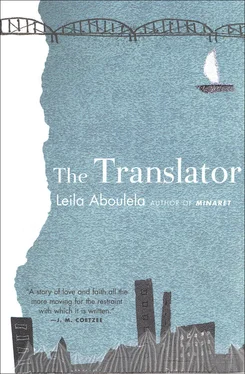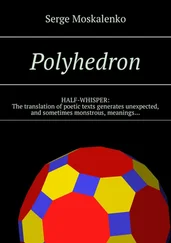‘Fine.’
‘You know that she kicked ‘Am Ahmed out of the house?’
Sammar shook her head, bit her lip. It was all her fault. He didn’t deserve that. She wondered how many people knew the whole story, almost a scandal. The elderly religious man, already married with two wives, setting his eyes on a young widow, her husband not yet a year in his grave. And the foolish girl did not turn him down straightaway. Instead she said she would consider it. An educated girl like her!
‘What happened?’ Her voice was quiet with reluctance, as if she didn’t really want to know.
Waleed shifted in his chair. ‘He came for a visit. I was there. It was the Eid, some time after you left. We were all just sitting there normally then Mahasen suddenly turned on him and shouted, don’t ever set foot in my house again; Tarig’s wife will never be yours… And on and on.’
‘Oh my Lord.’
‘Yes, it was unpleasant. We went and apologised to him later, me and Hanan. He was staying with his brother in Safia.’
‘Hanan never told me about this.’
‘There’s no need. The whole matter is finished. I think he doesn’t come to Khartoum so often now. Business isn’t what it used to be. I’ve lost touch with him. He was cordial enough with us when we went to apologise, but things can’t be the same again.’
‘He’s a good person,’ she said. He was a life-long family friend. When she was young, he used to lift her up to sit on top of his van, he used to give her sweets. She was never afraid of him.
‘What he did was an exaggeration.’ Waleed’s tone was dismissive.
She didn’t say anything and he went on, ‘I was just concerned with how Aunt Mahasen is with you. If you’re comfortable living with her. Especially if you’re insisting on not going back to Aberdeen.’
‘She never speaks about what happened. As for living with her, Amir and I both have a share in the house. It’s our right to be there.’ At one time the house was shared between Mahasen, Hanan and Tarig. After Tarig’s death Mahasen’s share increased, Hanan’s remained the same, Sammar inherited a share and to Amir went the biggest portion. The biggest in comparison to the others, but it was less than half of the house. None of them had the cash to buy the others out. If they sold the house and divided the money, it would not be enough for each of them to get a decent place elsewhere.
‘It’s not really the custom,’ Waleed said, ‘for a widow to live with her in-laws. It’s as if you’re giving the signal to everyone that you don’t want to get married again.’
‘It doesn’t matter… I don’t really care what signal people get.’
He looked sad all of a sudden and when he spoke his voice was softer, childlike, her baby brother of long ago. ‘I’m sorry, Sammar. I’m sorry that I’m your only family left and I can’t take you and Amir in…’
The thought of her and Amir living with Waleed and his wife in their new flat was ridiculous enough to make her want to laugh out loud. But she controlled herself and in the silence caught some of Waleed’s change of mood. His words ‘I’m your only family left’, and an awareness of their long-dead parents, a longing for them and what they could have offered.
‘I’ve been sitting here,’ she finally said to tease him, ‘thinking you want to get rid of me and send me back to Aberdeen. Instead you want me and Amir right here with you, so that your wife will go mad and return to her father’s house.’
He frowned and became his own irritated self, ‘Of course you have to go back to your job in Aberdeen…’
She tousled his hair and gave him a hug. The neon light above their head buzzed, glowed and came on. Some of the streetlights blinked. ‘Hey,’ yelled the children and rushed indoors to the light of the sitting room.
The computer was on the dining table, swathed in plastic covers. The printer, similarly covered, was on the nearby sideboard. Sammar pulled out the dining chair that faced the monitor and sat down. The end of the power cut brought with it noisiness; the loud television, the purr of the air cooler, and from the bathroom she could hear the toilet filling up with water.
‘So how do I get this computer to work?’ she asked Waleed, who was telling the children that he didn’t have any cartoon videos.
‘I thought we agreed that you weren’t going to resign.’ He came over to her and frowned…
‘No.’
‘You’re really hard-headed, you’re not going to take my advice, are you?’
When she shook her head he shrugged and began to unveil his precious computer, lifting up the layers of plastic covers that protected it from dust. Everything was precious in Khartoum, even ink and paper, because it was all imported, so hard to replace.
It was not difficult to write the letter, she had handwritten it at home and just needed to type it then print it out. She needed two copies, the same wording but one addressed to Personnel, another to her head of Department. That was the normal procedure for resigning. She wrote ‘family obligations’ as the reason she could not leave Khartoum and come back to Aberdeen.
Waleed hovered around her as she wrote. ‘I’ll do the printing,’ he said when she finished and shooed her out of the way.
The letters slid out of the printer, smoothly, one after the other. ‘Isles,’ said Waleed as he lifted the second letter, ‘Professor R. Isles, an unusual name.’
‘Yes, he’s the head of department.’ For months, weeks she had not said his name, not once. Not heard it once, nor said it once, even in a whisper, to herself. Now to Waleed she said, her voice too bright, ‘Guess what the R stands for.’
‘Richard?’
‘No.’
‘Ronald Reagan?’
‘Don’t be silly.’
‘I give up,’ he said, dusting the computer screen with a cloth that he took out of a plastic pouch. ‘I’m not dying to know.’
‘Rae,’ she mumbled, mispronouncing his name. She wiped her hand on her skirt.
‘Rye, rai’ ?’ said Waleed putting the cover back over the machine.
She smiled. Rai’ was opinion in Arabic. ‘Yes,’ she said looking away. ‘He had lots of opinions.’
She sent the letters and told herself that she was not waiting, not expecting anything but an acknowledgement of her resignation, a formal response to her ‘Dear Professor Isles…’, something that one of the secretaries would type up for him, put a copy in his filing cabinet labelled ‘Administration’.
In Khartoum, no postmen walked the streets, no letters were delivered to people’s homes. Her aunt rented out a post-office box, owned a key that creaked opened a little metal door like a locker. Inside, the family’s post would be found, lying on a film of dust. Sammar turned the key of the post-office box and found nothing.
In Egypt when she had spent day after day interpreting interviews in Cairo, Alexandria and the south, she had waited for a message from him, some word. He knew where she was, he knew how to get in touch with her. She needed him to say, I didn’t mean it when I said get away from me, I didn’t mean it. That was what she wanted in those tense days. Different hotels, everyone she was working with enjoying the location, appreciative of Egypt, going out to see all the sights, and she sick inside, not sure of anything except that she must work, work hard, stay numb, not cry. Three weeks’ comforting herself, tomorrow he will get in touch with me, he knows where I am, tomorrow. She worked, she ate, she stayed in the same hotel with people who came from the same world he came from, worked in the same field. His competitors who wrote for the same journals he wrote for, went to the same conferences but in her eyes they were different than him, indistinct and cheerful compared to him. He could have been here, one of them, part of this programme. ‘They took someone else,’ he had said to her in the Winter Gardens, ‘someone with more palatable views.’ She had not understood what he meant by more palatable views.
Читать дальше












